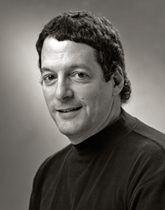
A couple of years ago, during a vacation at South Beach, my wife dragged me into an eclectic gift shop. After browsing for a few minutes, even Deb wasn't impressed with the smorgasbord of knickknacks. But on our way out, something caught her eye by the cash register. It was a display of refrigerator magnets with endearing sayings and pictures.
It just so happened that our refrigerator door had lots of empty space because our two artists-in-residence were growing up. High school didn't demand weekly watercolors from our daughter, Lauren, and the only fifth-grade extracurricular activities that motivated our son, Jesse, involved winning, losing, and a ball of some kind.
Thanks to the gift shop, though, our refrigerator's dark days were about to end. Deb found a magnet she wanted. When she showed it to me, I wanted it, too. It was just a white square that had this quotation:
Always make new mistakes.
–Esther Dyson
The message resonated with me because, in the opinion of many, I was about to make a mistake. I was employed as the editor of a collegiate magazine. Under my four-year stewardship, it won dozens of editorial awards. Yet, when I was presented with the opportunity to write a nonfiction book regarding a prominent physician who endured both heartbreaking loss and tremendous success, I jumped at the chance. That meant no more steady paychecks. No more paid vacations. No more benefits. No more retirement plan. But I had a chance to tell a compelling story in a book, something I always dreamed of doing when I was an English major in college.
So, not long after Esther Dyson's philosophy was featured prominently on my family's refrigerator door, my morning commute to work involved walking with my laptop from the bedroom to the basement. I had no illusions that the next 18 months of my life would lead to a guest appearance on Oprah or a home in the Hamptons where I would spend the rest of my summers writing my memoirs. I just figured that once I was done I would thrive as a full-time, independent writer going from project to project.
I'm the primary breadwinner for my family, so writing a book probably wasn't the most responsible decision I have ever made. But, as it turned out, I wrote "The End" just when Marilyn Kail, an associate publisher of Carnegie Mellon Today, asked one of my former colleagues if he knew of any magazine editors. He said he did, and, 10 interviews later, I'm here.
Everything worked out better than I had imagined. A small publisher has accepted my book and, with that dream realized, I have the chance to help tell more great stories–those of Carnegie Mellon's students, faculty, and alumni. One example is this issue's cover story. George Loewenstein is on the cusp of identifying what happens in our brains when determining what something is worth. He has discovered that a decision isn't always about dollars and cents. Sometimes, it's about making new mistakes.
—Robert Mendelson
Executive Editor



